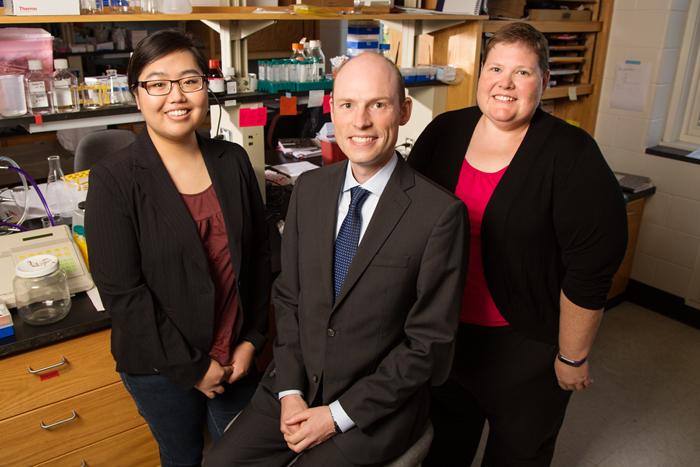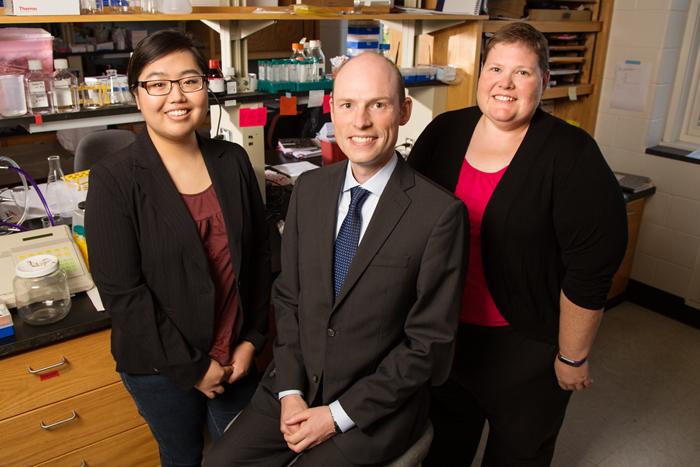
Credit: Photo by L. Brian Stauffer
CHAMPAIGN, Ill. — High cholesterol levels have been associated with breast cancer spreading to other sites in the body, but doctors and researchers don't know the cause for the link. A new study by University of Illinois researchers found that the culprit is a byproduct of cholesterol metabolism that acts on specific immune cells so that they facilitate the cancer's spread instead of stopping it.
The study, published in the journal Nature Communications, identifies new potential drug targets that could inhibit the creation or actions of the dangerous cholesterol byproduct, a molecule called 27HC.
"Breast cancer impacts roughly 1 in 8 women. We've developed fairly good strategies for the initial treatment of the disease, but many women will experience metastatic breast cancer, when the breast cancer has spread to other organs, and at that point we really don't have effective therapies. We want to find what drives that process and whether we can target that with drugs," said Erik Nelson, a professor of molecular and integrative physiology who led the study.
Nelson's group fed mice with breast cancer tumors a diet high in cholesterol. The researchers confirmed that high levels of cholesterol increased tumor growth and metastasis, and that mice treated with cholesterol-lowering drugs called statins had less metastasis. Then they went further, specifically inhibiting the enzyme that makes 27HC during cholesterol metabolism.
"By inhibiting the enzyme that makes 27HC, we found a suppressor effect on breast cancer metastasis. This suggests that a drug treatment targeting this enzyme could be an effective therapeutic," said Amy Baek, a postdoctoral researcher at Illinois and the first author of the paper.
The researchers also saw unusual activity among specific immune cells – certain types of neutrophils and T-cells – at metastatic sites high in 27HC.
"Normally, your body's immune system has the capacity to attack cancer," Nelson said, "but we found that 27HC works on immune cells to fool them into thinking the cancer is fine. It's hijacking the immune system to help the cancer spread."
See a video of Nelson describing the study on YouTube.
Because 27HC acts through the immune system, and not on the breast cancer itself, the researchers believe their findings have broad applicability for solid tumors. They performed experiments looking at colon cancer, lung cancer, melanoma and pancreatic cancer, and found that 27HC increased metastasis for all the tumor types, suggesting that a treatment targeting 27HC could be effective across multiple cancer types.
The researchers are working to further understand the pathway by which 27HC affects the immune cells. With clinical partners at Carle Foundation Hospital in Urbana, the team is working to establish whether 27HC has the same pathway in human patients as in mice.
"We hope to develop small-molecule drugs to inhibit 27HC," Nelson said. "In the meantime, there are good cholesterol-lowering drugs available on the market: statins. Cancer patients at risk for high cholesterol might want to talk to their doctors about it."
###
Nelson also is affiliated with the Cancer Center, the division of nutritional sciences and the Carl R. Woese Institute for Genomic Biology at Illinois. The National Institutes of Health and the Susan G. Komen Foundation supported this work.
Editor's notes: To reach Erik Nelson, call 217-244-5477; email [email protected]
The paper "The cholesterol metabolite 27 hydroxycholesterol facilitates breast cancer metastasis through its actions on immune cells" is available online.
Media Contact
Liz Ahlberg Touchstone
[email protected]
217-244-1073
@NewsAtIllinois
http://www.illinois.edu
Original Source
https://news.illinois.edu/blog/view/6367/565979 http://dx.doi.org/10.1038/s41467-017-00910-z





